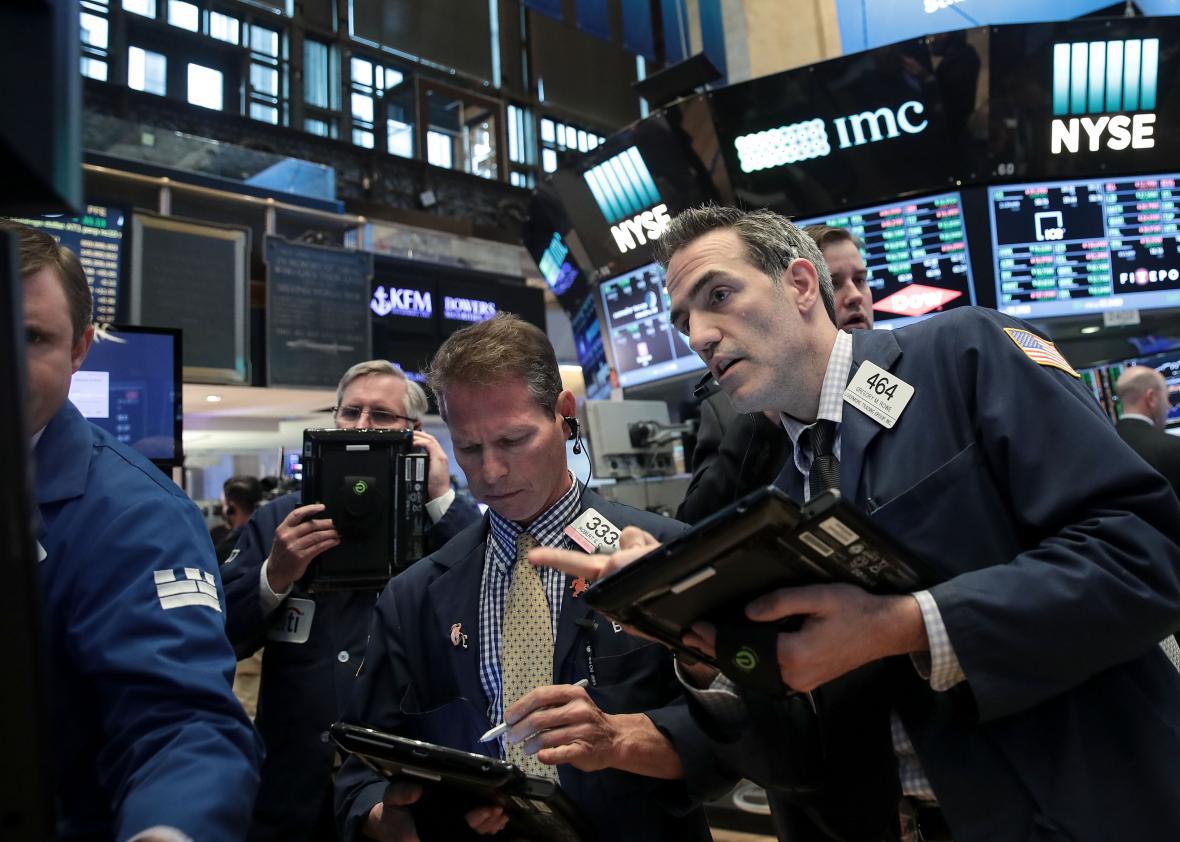The U.S. body politic—our political markets—is in a near-constant state of Trump-induced hysteria. The outrages and mind-scrambling moments come so fast and loudly these days that any political junkie not walking around in a perpetual state of agitation simply isn’t paying attention. And yet the U.S. body financial—our stock markets—seems to be in a state of mindful bliss.
The main stock market indices, the S&P 500 and the NASDAQ Composite, have ground steadily upward so far in 2017, continuing to set new record highs. At the same time, the main measure of stock market angst has fallen to record lows. Here’s a 10-year chart of the VIX index, often referred to as the fear index, which is a proxy for investors’ concerns about stability in the markets.
What gives? After all, many people view the stock market as a kind of barometer of the president’s performance. As Treasury Secretary Steven Mnuchin told CNBC earlier this year, “This is a mark-to-market business”—meaning the stock market was keeping score. But that’s not true: While Trump’s approval numbers wallow deep in bear-market territory, stocks continue to levitate.
One explanation could be politics itself. With Republicans in control of the House, the Senate, and the presidency, many investors have reasoned that Trump’s professed agenda of tax cuts, deregulation, and infrastructure spending would kick economic growth into a higher gear and finally liberate the stock market—which tripled under Obama, by the way—to be its own best self. In this blinkered-but-persistent view, the fact that Trump and his Republican allies have been unable to pass any important legislation thus far simply gives more fuel to this thesis. Once those tax cuts are passed, the reasoning goes, the market will really take off—so buy now.
Gigantism also helps explain the performance of the stock market. Both the S&P 500 and the NASDAQ Composite are market-weighted indices, which means that the biggest companies exert the most significant influence on the direction of the indices at large. And just as the rich are getting richer, hoovering up an ever-larger slice of the pie for themselves, the biggest companies are getting bigger and more powerful. We see this in the technology space in particular, where Facebook, Amazon, Apple, Alphabet, and Microsoft are sporting 12-figure valuations and feeding off their own momentum. Those five stocks account for about 10 percent of all stock market valuation, and they are responsible for a disproportionate share of the recent rise of the NASDAQ. And these companies, which dominate global markets and enjoy fat margins, are largely immune from political concerns.
On top of all that, the economy is basically fine, and in some areas quite good. Yes, the economy’s growth as measured by the gross domestic product is stuck in low gear (what else is new?). But when it comes to employment, housing, retail sales, and industrial production—all the things that tend to undergird an economic expansion and make people feel good about owning stocks—things are basically dandy.
Finally, as Michael Santoli writes at CNBC on Tuesday, there’s a larger point. The stock market can do just fine in times of political turmoil and constitutional crisis. “In the middle of World War II, following the Battle of Midway in 1942, the Dow industrials surged 40 percent in a year even as the war news remained bad and the outcome unclear,” he writes. Pull up a long-term chart of the S&P 500 and overlay the many moments we’ve had cause to question the viability of the American project. You’ll notice that stocks churned higher through Iran-Contra, through the Clinton impeachment drama, and through the fevered aftermath of 9/11. It is true that stocks fell during the Watergate period and during the Bush v. Gore tussle of late 2000. But in both instances other significant factors (higher gas prices and inflation in the 1970s, the already-looming recession in 2001) contributed to the downticks.
This is not to say that stock markets will forever ignore the meshugas in Washington. Market sentiment—and the rationalization for investor behavior—can turn with remarkable speed. But for the moment, the fact that readers of Politico and Daily Kos are freaking out on the daily doesn’t mean we should expect the readers of Barron’s and TheStreet.com to do so, too.
